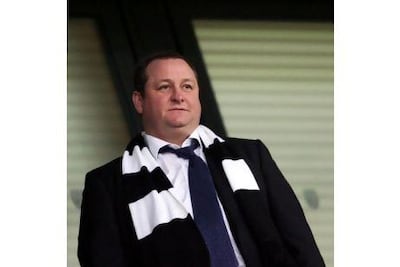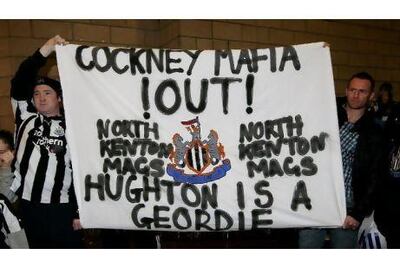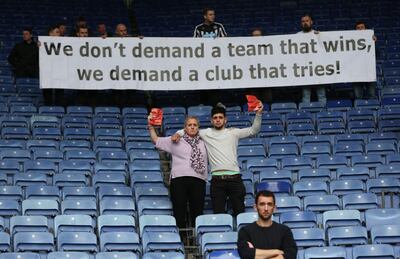In 2007 the British businessman Mike Ashley paid a reported £134 million (Dh648.6m) to acquire the English football club Newcastle United.
Last week's news that the founder of the UK retailer Sports Direct was looking to sell up for a reported £380m was welcomed by fans, former players and nearly everyone connected with the north-east England club.
Shortly afterwards it emerged that Amanda Stavely, who runs PCP Capital Partners, which acts for investors in the Middle East and China, was eyeing a possible purchase of the club. Speculation over Ms Staveley's interest in the St James' Park club was sparked when she was seen at the ground watching a match earlier this month against Liverpool, another club she has been linked with buying in the past. On Monday, the north-east newspaper The Chronicle said Newcastle United will continue talks with Ms Staveley and PCP Capital this week.

And while the financier - who leads a group valued at £29 billion - was not at Newcastle's game at the weekend, it emerged that somebody from the group was in attendance on a watching brief at St James’ Park, the paper said.
Ms Staveley’s group signed a non-disclosure agreement last week and have now entered what is known as the “data room” stage of due diligence.
It is expected that this process could go on for up to a month before PCP decides whether or not to put in a formal offer, which Reuters cited sources as saying would be around £300m.
Ms Staveley is no stranger to football takeovers and played a role in brokering a deal with Sheikh Mansour bin Zayed's Abu Dhabi United Group to buy Manchester City from Thaksin Shinawatra in 2009.
Mr Ashley, who is from Buckinghamshire, just west of London, (although to Newcastle fans, that is as good as being a Londoner), has declared he hopes to have found a buyer by Christmas.

Should he sell to PCP, even for almost £80m than he is apparently asking, Mr Ashley looks set to make a handsome profit. However, he is no longer a popular figure in the city of Newcastle in England's north-east and, while the club might ultimately represent an astute investment by the billionaire, his stewardship of it has been unsuccessful by most criteria.
Premier League sides have proved popular with oil rich investors willing to pump in millions of pounds in return for the status of owning a team. Clubs like Chelsea and Manchester City have been major beneficiaries, with the Russian billionaire Roman Abramovich and Abu Dhabi United Group respectively bankrolling lavish transfer spending in pursuit of silverware.
Silverware is conspicuous by its relative absence at Newcastle's ground St James Park, a point visiting fans are prone to making. The club has not won a major domestic trophy since 1955 and finishing top of England’s second tier on four occasions will come as scant consolation for fans accustomed to supporting a team in the top flight.
While overseas investors have transformed Chelsea and Manchester City into perennial title contenders, for the past few seasons Newcastle United seems to have existed in a sort of stasis between the English Premier League (EPL) and the second-division Championship. The club has been promoted and relegated twice under Mr Ashley’s stewardship, Although, to be fair, those two spells were the club's first in almost a quarter of a century. European success now seems an equally elusive fixture, despite Newcastle having played in European competitions 11 times in the past 22 years, including the Champions League, and they reached the quarter finals of the Uefa Cup in 2005 and its 2013 incarnation the Europa League.
Football is ultimately a results business and Newcastle’s success is reflected by their position in the EPL table, 7th after last weekend’s win against Crystal Palace. Assessing an owner’s performance is always going to be much more subjective but a London-based charity specialising in stewardship issues has given it a go.
In 2009 the business think tank Tomorrow’s Company released a stewardship table that judged the performance of EPL club owners. Newcastle United were not in the top tier of English football at the time but the charity’s chief executive Neil Davy does not think it would score highly under its current ownership.
"The ideal owner would score 50 with 10 points for each of our criteria. On our current assessment ... Newcastle might scrape 14 points out of 50, which would put them pretty near the bottom of the league," he tells The National.
Mr Davy goes on to outline the criteria behind the Tomorrow’s Company stewardship table. “We have long argued that football clubs need owners who are stewards and not wheeler-dealers. We came up with five criteria for our table; we were looking for owners who promoted the success of the clubs and not themselves, who showed long-term commitment, who were clear on their role and purpose, who truly engaged the fans and the local community and who demonstrated passion for the club.”
The UAE-based Newcastle United fan Paul Venn says he will not be sorry to see the back of Mr Ashley.
______________
Read more:
Indonesia and Thailand’s joint World Cup bid looks destined for failure
English football's big winners show UEFA sense of fair play is misguided
EPL transfer amount touches £1bn driven by TV money
______________
“Very few will look back at his time fondly. It’s a popular misconception that we are deluded and expect to win everything all of the time but that couldn’t be further from the truth. Sport is meant to be entertainment. All we ask for is a club that tries its best all of the time and that’s not something that can be levelled at Mike Ashley’s Newcastle tenure.”
Mr Venn acknowledges that Newcastle United, whose nickname is "the Magpies", are unlikely to be overtaking teams such as Chelsea and Manchester City anytime soon. However, he feels there is no excuse for the club failing to cement its EPL status,
“With sensible investment and ambition we would be right up there," he says. "No one expects us to compete with the top three clubs because of their wealth but there is absolutely no reason, other than Ashley’s decision making, why we should not be competing with Spurs and even Arsenal for a top six place.”
The figures suggest that Newcastle fans who accuse it of lacking ambition in the transfer market might have a point. Last summer EPL teams splashed out a collective £1.4 billion bringing in players but the Magpies' manager Rafael Benitez spent just £36m.
£24.5m of this was offset by player sales meaning that Newcastle’s net spend was a mere £11.5m. Football fans might not be familiar with the stewardship table but in the EPL era they are an economically astute bunch who will understand the significance of the net spend table.
By deducting the money raised through player sales from the fees invested in new signings it is possible to gauge a club’s ambition with some accuracy. Newcastle United had the 15th highest net spend in the Premier League last season. Manchester City led the way with £143.1m followed by Manchester United on £130.7m and Chelsea on £75.7m.
You could draw the conclusion that the Newcastle United board would be content with a 15th place finish. In 2016 Leicester City won the title with the 16th most expensive squad in the Premier League but this remarkable exception only proves the rule; statistically there is a very close correlation between how much a club spends on players and where it finishes in the league.
There has never been a more lucrative time to be in the EPL - Sunderland received £99.9m for finishing 20th last season. Newcastle reportedly earned a mere £7.1m for winning the Championship, which demonstrates why clubs in the top tier will spend frantically to stave off the threat of relegation.
Mr Ashely's current valuation reflects an expectation that the club will be receiving £100m or more per season in Premier League prize money. The price would plummet if potential buyers perceived relegation to be a real risk, which might explain why Mr Ashley has chosen to publicly put the club on the market now.
With a population of almost 900,000 at the last count, Newcastle is a significant city but sports United as its only professional football team. Their is fierce rivalry, however, with Sunderland, just 18km from the Magpies' ground. St James' Park has a capacity of 52,354 and the club can point to a proud 125-year history, which has bought four league titles and six FA Cup wins.
There will be an opportunity to reinforce the playing squad when the transfer window opens in January while Benitez remains one of the most respected figures in European football and proved his loyalty by spending a season in the Championship when the club was relegated. These are the sort of fundamentals that might possibly make £380m sound like a reasonable price.
Newcastle United has huge potential from both an economic and a sporting perspective but stewardship of a football club is no easy task, as Mr Ashley discovered.
Supporters will expect any new owner invest heavily in reinforcing the first team squad.
Whether a suitable buyer, from the Middle East or elsewhere, will be found before Christmas remains to be seen.


